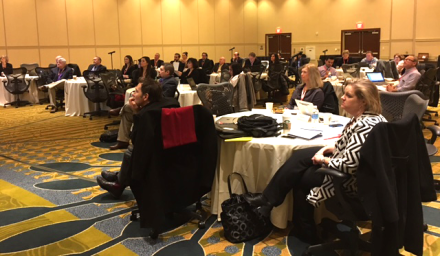
Better. Faster. Now.
How do we apply the ‘regulatory learnings’ of the past 18 months back into our robust Duchenne pipeline to ensure as many effective therapies yield from our pipeline as possible?
Under the leadership of PPMD’s Duchenne Drug Development Roundtable (DDDR), our community is determined to figure that out. Today is the first of a three-meeting series to address challenges and opportunities within our Duchenne clinical trial space.
A New Landscape
We’ve come a long way. We now have more than three dozen dedicated, publicly and privately traded companies in Duchenne, more than a dozen therapies in late stage clinical trials, and a robust pipeline representing an array of therapeutic approaches not far behind. Our community also has crossed into the post-approval space with the accelerated approval of EXONDYS 51 In September – and we anticipate another regulatory decision for Marathon’s deflazacort soon.
But the last two years – two years of intense product reviews for our Duchenne therapies – have provided us with both additional challenges and opportunities. These reviews – coupled with PPMD’s policy engagement around the Duchenne community-led Draft Guidance, provisions within 21st Century Cures, Benefit-Risk studies, and PDUFA VI commitments – have resulted in an opportunity to take what has been learned from all trial experiences and work together to improve.
Creating an Agenda
PPMD and the leadership of our DDDR felt that this is a strategic inflection point for Duchenne; a moment to bring industry partners together to assess how these ‘regulatory learnings’ and new policies might best be applied back into our pipeline and into clinical trial design.
To achieve this, the DDDR Steering Committee mapped out a series of three one-day meetings. Each will include leaders and innovators from outside the Duchenne space to present on opportunities to enhance our existing trial designs, tools, and infrastructure. Following the meeting series, a report will be published.
The meeting series topics include:
- Clinical Trial Readiness – Patients, Families, and Treating Physicians
- Optimizing Clinical Trial Design
- Clinical Trial Readiness – Sites & Investigators
The Duchenne Drug Development Roundtable
Established more than seven years ago, PPMD’s Duchenne Drug Development Roundtable (DDDR) is a group of committed innovators representing Industry and relevant stakeholders that has the goal of accelerating the development of meaningful treatments for Duchenne muscular dystrophy through open discussion to minimize duplication and to pool resources in pre-competitive space.
 PPMD appreciates the support of our partners which enables the DDDR to continue driving the field forward.
PPMD appreciates the support of our partners which enables the DDDR to continue driving the field forward.
We are extremely grateful to the DDDR Steering Committee and the company representatives who have served as planning committee members for each of the three meetings. Their guidance and leadership has impacted our Duchenne community in immeasurable ways.
The DDDR Steering Committee includes:
- Cliff Bechtold (BMS)
- Michael Binks (Pfizer)
- David Cox (Eli Lilly)
- Joanne Donovan (Catabasis)
- Cartier Esham (BIO)
- Ed Kaye (Sarepta)
- Kim McCleary (FasterCures)
- Thomas Meier (Santhera)
- Jeff Watkins (patient community representative, parent)
We appreciate each company that has come to the table to lean in even further – and we look forward to the opportunity to work together as a community to explore the innovations and opportunities that are raised through the coming days of discussion and exploration.
This Roundtable series summary will be disseminated to all DDDR members in time for discussion at our annual DDDR meeting in June. We hope that all of our Duchenne partner organizations will continue to join us in this annual discussion and planning meeting.
It is our hope that this DDDR meeting series will assist PPMD and the Duchenne community to work together to drive forward collaborations and projects that will benefit all partners working in this space – and yield effective therapies that are accessible to all who need them.
Better. Faster. Now.



 by: Parent Project Muscular Dystrophy
by: Parent Project Muscular Dystrophy


